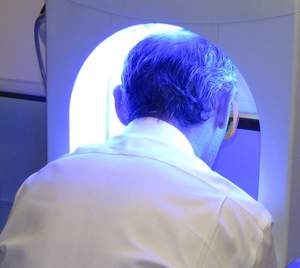NEWPORT BEACH, CA--(Marketwired - May 16, 2014) - The Skin Cancer and Reconstructive Surgery Center, known for its cutting-edge technology, patient care and clinical education, is continuing its repute for excellence and innovation in the field of non-surgical skin cancer therapy with the introduction of Photodynamic Therapy (PDT). Used to treat the face and scalp for Actinic Keratoses -- precancerous, rough textured, dry scaly patches on the skin caused by past sun damage -- this treatment uses a light activated medication to destroy precancerous lesions. The medication is first absorbed by the AK cells where it is converted to a chemical that makes the cells extremely sensitive to light. When the AK cells are exposed to the BLU-U® Blue Light Illuminator, a reaction occurs which destroys the AK cells.
Simon Madorsky, M.D., medical director at the Skin Cancer and Reconstructive Surgery Center, has thoroughly research the effectiveness of PDT for the treatment of actinic keratosis, and has had the PDT treatment himself. He is also the first and only doctor in Southern California to use PDT for the treatment of early basal cell carcinoma.
"Actinic Keratosis are considered to be the first step in the development of skin cancer and studies have shown that approximately ten percent progress to squamous cell cancer within an average of two years," said Madorsky. "At Skin Cancer and Reconstructive Surgery Center, we are constantly evaluating treatments and technologies that treat skin cancer without intrusive or conspicuous cosmetic consequences. PDT has been shown to be a practical and proactive means to destroy potentially cancerous cells including basal cell carcinoma without visible scars, extensive appointments or recovery, and it is relatively inexpensive."
PDT Provides Alternative to Traditional Surgery
The PDT treatment is performed as an outpatient procedure and leaves only subtle temporary markings and no permanent scarring. Compared to other treatments, like liquid nitrogen, 5-FU or Aldara, PDT is virtually painless, the side effects are minimal, there is a quick recovery time, and fewer procedures are necessary.
PDT is a two stage process: An initial office visit to apply the medication to the target lesions, and a second visit the following day to illuminate the medicated area with the BLU-U® Blue Light Photodynamic Therapy Illuminator for about 15 minutes. Patients may experience a slight stinging, tingling or warm sensation during treatment, and a cool fan will be provided to minimize any discomfort. Following the PDT treatment, burning and stinging sensations may last for up to 24 hours and the patient may experience slight redness and crusting for up to 5 days following the treatment. Patients should protect the treated area from sun exposure or prolonged or intense light for at least 40 hours following the procedure.
The procedure costs less than surgery and is covered by most insurance plans. For more information please visit www.ocskincancer.com.
ABOUT THE SKIN CANCER AND RECONSTRUCTION SURGERY CENTER:
The Skin Cancer and Reconstructive Surgery Center located in Newport Beach, Calif., offers a comprehensive array of innovative techniques for skin care and skin cancer treatments. Dedicated to providing excellence in patient care, clinical education and research, the center includes an ambulatory surgical facility accredited by the Joint Commission, two operating rooms, private pre-op and recovery rooms, a CLIA certified Mohs Laboratory (Clinical Laboratory Improvement Amendments), and Radiation Therapy Suite. Through a combination of both invasive surgical and non-invasive non-surgical, the Skin Cancer and Reconstructive Surgery Center provides patients with a holistic approach to treat, reconstruct and improve the appearance of the skin. For more information, call 949.200.1600 or visit www.ocskincancer.com.
Contact Information:
CONTACT:
Sabrina Suarez
Echo Media Group
714-573-0899 ext. 227
Sabrina@echomediapr.com
